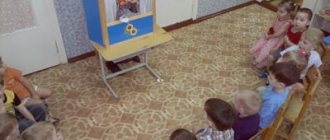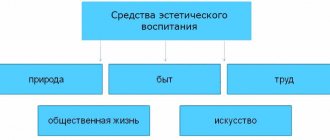Patriotic education consists of instilling in a child love for his native land and the country as a whole. Thanks to patriotism, the Great Patriotic War was won, when the power of the German army was broken by the sense of civic duty of the Soviet people.
Today they talk a lot about the economy, the need to develop the country, and are engaged in production and construction. For some reason, patriotism fades into the background; it is erased by admiration for Western values. The democracy that came to us to replace the Soviet regime teaches tolerance to all views and worldviews. But we must not lose the values of our society, because patriotism is associated with them.
Give your child a piece of paper and ask them to write the word "Middle Name" . If the word is written with a capital letter, then your child at school received the first concept of patriotism and love for the Motherland. If the first letter is a small letter, then you need to pay attention to family patriotic education and instilling patriotism from an early age.
The majority of adults received a dose of patriotism. Those who found the Soviet Union do not need to be told what the title of pioneer or Komsomol member meant to them. For men, the army made a huge contribution to patriotic education. Now there is no single and official ideology, as there was in the Soviet Union. Therefore, in a large flow of very diverse information, it is difficult for children to understand that they need to love their Motherland and their land.
As long as we remain patriots of our land and masters in our country, other states will take us into account. To do this, we must love our country, our land and its riches. The family plays a huge role in the education of patriotism - children copy the behavior of their parents and subconsciously become attached to their point of view.
Raising patriotism in the family
Start raising your child as a patriot with a normal microclimate in your family nest. You cannot quarrel with your significant other, lead an immoral lifestyle, drink alcohol and smoke cigarettes. Parents themselves must love their Motherland, then no effort on their part will be required to raise their children. Educational lessons will take place naturally and naturally, and children will be imbued with love for the Fatherland without much work for themselves.
Learning to play chess for children
The feeling of love for the Motherland begins with love for the family and the formation of a sense of responsibility for each of its members. In case of trouble, everyone should rush to the aid of one and save him as long as it is necessary and there is an opportunity. Likewise, one person should fight without hesitation for the well-being of his entire family.
Note:
You need to tell your children more often about the life of your family; there are probably outstanding personalities in your family. Take a family album and tell your children about their grandparents, aunts and uncles, brothers and sisters. Try to tell the truth, but focus on their positive achievements.
Walking around the neighborhood with parents helps strengthen patriotism. A boy can be taught to make a fire, and a girl can weave wreaths from meadow flowers. Such a pastime will be remembered for a lifetime. Even if fate in the future takes your children to distant lands, they will still reverently remember these walks in their native land.
Important:
You need to love your homeland not just for show, but with your soul and heart . The price of such love is worthless when, after loud patriotic speeches, the head of the family, as if “accidentally,” throws out the wrapper in the middle of the street.
MAGAZINE Preschooler.RF
Family is the basis of patriotismEnina Nadezhda Leonidovna Teacher MBDOU TsRR d.s. "Ryabinushka" city of Abakan Republic of Khakassia
Family is the basis of patriotism. Family is truly a high creation. It is a reliable barrier and a pier. She gives calling and birth. She is the foundation of everything for us.
(E. A. Mukhacheva)
Patriotism is one of the deepest feelings, consolidated over centuries and millennia. Scientists and geneticists claim that humans have a patriotism gene. But no one still knows from what drops this quality is formed in a little person, although, apparently, the very first drop is family - mom, dad, home, the nature of his native land. The essence of patriotic education in kindergarten is to sow and grow in the child’s soul the seeds of love for home, family, nature, the history and culture of the country, created by the labors of relatives and friends, those who are called compatriots.
Conditions for the implementation of patriotic education:
- Be a patriot yourself.
- Create an appropriate environment.
- Involve parents.
- Establish a connection with others.
The first educators of a child are his parents. They lay down the concept of a small homeland and family values. We, as educators, are obliged to help parents with this.
Currently, this work is relevant and especially difficult, requiring great tact and patience, since in young families the issues of instilling patriotism and citizenship are not considered important, and often only cause bewilderment.
The main pedagogical idea for the implementation of this direction in education is: “To transform the kindergarten’s interest in the educational process into a family interest. To unite not only the children’s group into a team of like-minded people, but also to make their parents our allies . That is
- To convey to parents the truth that the right and responsibility of raising their children is parental right and responsibility.
- Strengthen parents' sense of confidence in their strengths and wisdom.
- Enrich parents' knowledge about raising children with publicly available scientific information.
- To improve the psychological and pedagogical culture of parents raising children of primary preschool age.
- Provide assistance in managing your own behavior and the behavior of your children.
- Train parents in pedagogically effective communication with children.
- To involve parents in the orbit of pedagogical activity, to interest them in the educational process as a necessity for the development of their own child.
In order to attract parents to events, teachers widely use various forms of work, both group, subgroup and individual.
- conversations;
"I love you, Russia"
"Who lives in our republic"
"State symbols of Russia"
“Moscow is the capital of our Motherland”
"Russian national costume"
- consultations:
"Cultivating independence and responsibility",
“How to raise a little citizen”;
- joint competitions:
“Gifts of Autumn” , “My Herbarium” , crafts from natural materials, crafts from vegetables, seasonal exhibitions of joint works “New Year’s toys” ;
- joint work of children and parents on the topics: “My family” , “Sports family” , “How I spent the summer” . A photo album is prepared, which the children then constantly refer to and show each other photographs of their family. Children share their impressions, learn to listen to each other, and show interest in the interlocutor.;
- leisure, holidays:
“Mother’s Day” , “Dad, Mom, I – a friendly family” , “Fun Starts” ;
Folklore holidays of the Russian and Khakass people.
- instructions for parents.
General consultations, group and general parent meetings, conferences, exhibitions, lectures, clubs are organized for the group of parents; round table meetings.
When conducting the questionnaire, we found out that we ourselves do not always know our ancestry, at best our grandparents. Family heirlooms are also not always available in the family. This also makes you think. We are currently preparing for the exhibition “My Family’s Coat of Arms ,” where parents and their children will come up with and create a Coat of Arms for their family.
All this contributes to the development in children of such qualities as love for their home, family, and kindergarten.
K. Ushinsky believed that patriotism is not only an educational task, but also a powerful pedagogical means of education. And education is life, simple and complex, beautiful and not so beautiful, but always interesting. It is worth working hard for him to love this world and himself as a full part of it.
Literature:
- Raising a little citizen...Kovalyova G.A. M.: ARKTI, 2005
- Vinogradova N.F., Sokolova N.A. My country is Russia. Enlightenment, 2001
- Lessons on citizenship and patriotism in kindergarten. Barannikova O.N.
- Where does the Motherland begin? Kondrykinskaya L.A. M. 2004
Questionnaire for parents
“Moral and patriotic education in the family”.
1. What do you understand by the term “patriotic education” ?
- Fostering love for the Motherland;
- Fostering respect for the older generation;
- Fostering respect for the traditions and customs of one’s people;
- Knowledge of the history of your country;
- Other- ___
- I find it difficult to answer.
2. Is patriotic education possible in kindergarten?
- Yes;
- No;
- I find it difficult to answer.
3. How, in your opinion, should the goal of patriotic education of preschool children be formulated?
- Instill in children respect for the people of their country;
- Introduce you to the customs and traditions of your people;
- Develop a caring attitude towards nature and all living things;
- Expand ideas about your native land, its capital, cities;
- Familiarization with the historical past of Russia;
- Education of aesthetically moral standards of behavior and moral qualities of a child.
4. Who do you think is responsible for the patriotic education of children - teachers or parents? ___
5. Do you think that preschool children should be introduced to the symbols of the state, traditions, and memorable dates?
- Yes;
- No;
- I find it difficult to answer.
6. Do you think the topic of familiarizing yourself with family pedigree is relevant in modern society? Are there family traditions in your home? ___Thank you for your cooperation.
Questionnaire for parents
“Moral and patriotic education in the family”.
This survey is anonymous (you are not giving your last name, so please be as honest as possible.)
1. Do you consider yourself competent in matters of patriotic education?
- Yes.
- No.
- “be a patriot” mean to you ? ___
- Do you think it is important to educate preschool children with moral and patriotic feelings?
- Yes.
- No.
- Where do you think a child learns the basics of patriotism?
- At school.
- In family.
- In kindergarten.
- Does your child have a desire to learn about their hometown?
- Yes.
- No.
- Sometimes.
- Do you tell your child about Kstovo, its history, sights, famous people?
- Yes.
- No.
- Sometimes.
- What places in our city do you like to visit with your child? ___
- What do you personally do to instill in your child a love for his hometown? ___
- What kind of help do you expect from kindergarten in this area? ___
Abstract of educational activities on social and moral education for children of the senior group. Topic: “Big and Small Motherland” .
Goal: to form in children an idea of their hometown as a small Motherland.
Educational objectives:
- give children an idea of what a “small Motherland” , native land
- clarify and expand knowledge about your hometown and its history
Developmental tasks:
- develop memory, imagination, coherent speech
- activate vocabulary on the topic
- develop cognitive interest and curiosity.
Educational tasks:
- cultivate love for your small Motherland, a sense of pride in your country
- cultivate respect and love for your hometown.
Preliminary work: conversation about the city and looking at postcards with views of the city; reading a poem about the city.
Vocabulary work: native, native side, Motherland, Russia, small Motherland, big Motherland.
GCD move:
Educator:
- Hello, guys, my dear preschoolers!
Did you all wake up early? Did you smile at each other?
Hello, have you told everyone? What did you wish for each other?
At each lesson, we reveal the mysteries and secrets of a new word. Are you ready to learn another secret today? But first, let's remember a word you already know. Listen carefully and remember his secret. So, the word “native” . Let's play our favorite game "Choose a Word" . Come up with a suitable word for the word “native” , “native” . Remember who or what we can call “native” , “native” .
(Children's expected answers: mom, dad, brother, sister, home, kindergarten, city, region, etc.)
Educator: Great choice! Let's remember how this word can sound in poetry:
Mother.
There are many mothers in this world. Children love them with all their hearts! There is only one mother, she is dearer to me than anyone else. Who is she?
I will answer, my dear mother!
Educator: Listen again: “My dear mother!” . Let's all say together tenderly and affectionately what our mother is like, the word “dear” .
Children and their teacher pronounce the word “native” .
Kindergarten.
Early in the morning, the Kindergarten welcomes the Kids. There are toys for the kids, They're bored in the corner.
Red ball, Blue ball, Dolls, teddy bears... Kindergarten! Our native garden!
All the guys love it!
Educator: Let’s all say together, mischievously and cheerfully, “our native garden!”
Children with a teacher pronounce the word “native” .
Educator: This is how the same word can sound differently. And I came up with “native side” . "home side" means ?
Expected answers from children6 house, land, fields, forests, city, etc.
Educator: Our homeland is the place where everything is dear to us, close, where we were born, where everything is dear to us. This place is called Motherland by another name! Listen to how this word sounds.
A child reads a poem:
Russia, my Motherland! Take care of yourself! Its expanses are blue
Painfully dear, dear ones. Russia is my homeland, yours, and our loved ones.
We say thank you for everything! And we bow low!
Educator: Guys, did you hear the words we talked about? Russia! My motherland!
Try to say these words proudly and proudly. I have a surprise for you. (The teacher puts on items of clothing: a scarf, glasses, opens the chest.)
Grandmother: Help me, Alyosha, open the chest!
Lesha: What do you have in your chest, grandma?
Grandmother: Yes, the things are different, I got them from my grandmother. I take care of them, they are family to me. (Lesha and his grandmother take out things - a scarf, a carpet).
Lesha: And the carpet needs to be cleaned, oh how it needs to be cleaned.
Grandmother: Alyoshenka, clean the rug, and I’ll go and do some housework. (Children help.)
Alyosha is cleaning the carpet, suddenly the carpet begins to cough, the boy fearfully approaches the teacher, who has already taken off elements of his grandmother’s clothes.
Carpet: It's me, carpet! I'm not a simple carpet, but a magical one. I am a carpet - an airplane!
Educator: Guys, I have an idea! Let's ask the magic carpet to help us make a short trip. Carpet - airplane, please help us understand what the Motherland is?
Carpet: Of course I’ll help, make yourself comfortable, let’s fly!
Educator: Look, guys, our native city of Abakan, our small Motherland, has been left behind. The taiga began all around. But this is also our Motherland, our Republic of Khakassia! Look down, the Abakan River stretches below us, and over there, not far from the shore, there is a yurt, a fire is burning near it. With his warmth he calls us to him. Let's go down to him. And let's listen to the legend about the Abakan River:
A long time ago, when mountains were born on the land of Khakassia, a bear (ABA) appeared in these parts. For many years he attacked people, destroyed livestock, and kept the inhabitants of the surrounding villages and villages in fear. One hunter decided to help people. He found a bear and fought with it. They fought for a long time, trying to defeat each other. Finally, the bear could not stand it. Seriously wounded, he fled from the hunter. The hero set off on the trail of the beast. Soon, in the middle of the wild taiga, I saw a dead bear that had turned into a huge mountain. A stormy stream flowed out of the mountain, absorbing more and more streams. They gradually turned into a stream. Below, the stream became a river. ABAKHAN (bear's blood) - this is how the locals began to call this river.
Physical education minute:
We walk one after another through the forest and green meadow. Motley wings flicker - Butterflies fly in the field.
One, two, three, four - They flew, circled...
Educator: We’re having fun, but it’s time to fly further, around our Motherland! Look, the taiga and the Abakan River are already left behind. Everything is our small Motherland! Look down at how wide the field is, and here is the birch grove. How slender and beautiful they are, let's sway them like birch branches. And above them is the sky! Yes, how clean, blue, dear! As big as our Motherland - Russia!
It's time for us to return, here we are at home in our native garden! Guys, we have revealed the secrets of such wonderful words Motherland - Russia. Draw how you imagine her.
| Next > |
The role of school in family patriotic education
Knowledge of the history of one's native land and country is usually given at the school desk. The Great Patriotic War is a difficult page in the history of our country, but it showed us that the united efforts of everyone and contribution to the common cause are the key to success. Hermann Goering admitted that Nazi Germany lost the war because it did not know the mentality of the Russian people. In terms of tactics and economics, all calculations were correct and aimed at victory, but in the ideological and patriotic component, it was almost impossible to defeat the Russian people.
Military-patriotic education of youth
In addition to studying and knowing your history, the following school activities to develop patriotism will make a positive contribution to the development of patriotic feelings:
- Labor lessons - here boys and girls are taught to create material values with their own hands.
- Physical education – children need to be taught to take care of their health. After all, only a healthy person will be able to take care of the development of his country and stand up for its defense if necessary.
- Literature - reading classics and contemporaries will tell children about the life of the Motherland in different eras.
Patriotic school education must necessarily overlap with family education. Regularly ask your children what they learned in class, participate in homework, and communicate with teachers. School is a second family, so don’t leave your child’s education to chance. Teachers have qualifications and experience working with children in the field of patriotic education, but they cannot completely replace the family.
What is patriotism?
Patriotism refers to both the homeland for a specific person in general, and a feeling of devotion to one’s fatherland, love for the Motherland, the desire to serve its interests, and protect it from enemies.
Patriotic education can be given a dozen definitions, but we will focus on the one that, it seems to us, best reflects the essence of this process. So, patriotic education is the systematic activity of government bodies and organizations to develop in citizens a high patriotic consciousness, a sense of loyalty to their homeland, readiness to fulfill civic duty and constitutional responsibilities to protect the interests of the country.
But if everything is clear with adults: someone received a portion of patriotism in the army, someone professionally studied history and military affairs - many factors could influence an adult, then how can you tell a child that loving Russia is good. And is it necessary to do this?
Recent statistics show that the younger generation has little sense of patriotism these days: surveys in schools and sections among children of different ages show that young people are not particularly interested in their homeland, its fate, or history. And the feeling of love for her practically disappeared from the radar.
Motivation of schoolchildren to study
How to instill in your child a love for school? Read our article!
Go to article
Of course, with the destruction of Soviet ideology, a more or less democratic structure replaced the regime in which a person was a cog in a single mechanism working for the benefit of his native country. The main thing today is the individual’s personality with its diversity, and the sense of duty to the homeland is decreasing due to constant armed conflicts, globalization, and the possibility of communicating with any person anywhere in the world. It `s naturally. However, there is something in this that should be feared: many of today's teenagers or children of primary school age do not have any feelings for their homeland. Don't you see the catch in this?
But the state sees. That is why, in our country, since 2001, methods of patriotic education have been introduced into the education system, which are aimed at creating a positive image of the homeland and capable of instilling love for a big, big country from a very early age.
“I believe that children should not so much be “drilled into” (sorry, I couldn’t find another word) patriotism and love for the homeland, but rather show it by example. This applies to attitudes towards veterans, the elderly, and children. This is even how we treat trash on the street and people who litter. After all, love for the motherland and patriotism are not only beautiful poems and achievements.”
Happy mother Evgenia Patyukova





